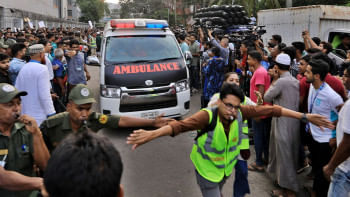Vamoose la Amistad, Argentina-Bangladesh

During the 1971 World Table Tennis Championships, a 19-year-old US player named Glenn Cowan hopped on a shuttle bus carrying the red-shirted Chinese national team. Zhuang Zedong, the team's greatest player, stepped forward to shake Cowan's hand, speak to him through an interpreter, and present him with a gift. This ping-pong breakthrough allowed China's leader, Mao Zedong, to invite the US team to make an all-expenses-paid visit to his country. Subsequently, the ping-pong diplomacy resulted in opening the US-China relationship, leading the US to lift its embargo against China on June 10, 1971.
During the same year, a new country named Bangladesh emerged on the global stage after a bloody independence war. In the tumultuous months of 1971, as the people of Bangladesh (then East Pakistan) struggled to free their territory from Pakistani rule, Victoria Ocampo, along with writer Jorge Luis Bergs, Reverend Father Ismael Quiles, and other intellectuals, academics, painters, jurists, and eminent authors, inspired and led the intelligentsia of Argentina and Venezuela to denounce the unfair war and seek aid for war refugees. Since the birth of the nation, Bangladesh has followed the principle of "friendship to all, malice to none" and participated in different multilateral forums, believing in multilateralism and global order. Bangladesh wishes to establish friendly bilateral relations with countries ranging from Western Europe to the Middle East to Latin America.
The official diplomatic relation between Bangladesh and Argentina was established in 1972 through the launch of a diplomatic mission in Argentina; however, they were closed a few years later, in 1978. Except for the official visits of the former foreign secretary of Bangladesh, Mohamed Mijarul Quayes, to the Latin American country in 2011 and the visit of the Undersecretary for Foreign Policy of Argentina, Claudio Javier Rozencwaig, accompanied by the Argentine Ambassador to Bangladesh, Hugo Gobbi, to Dhaka to commemorate 50 years of diplomatic relations, there has been no other noticeable progress in the bilateral relationship.
Currently, to get Argentinian visas, Bangladeshi citizens have to go to New Delhi, India, as the Argentinian Embassy of Bangladesh is situated there. The crazy public support for the Argentine football team, especially for Leo Messi, attracted widespread media attention both in Bangladesh and Argentina. The installation of giant screens in a number of locations around the country to witness the Messi-led renaissance of Argentina and the thousands of fans who gathered to celebrate every goal and the victory of their favourite team attracted the attention of almost everyone, from FIFA to the Argentine Football Association and their citizens as well.
Argentina did not forget to show Bangladeshis their love and respect in return. The football federation of Argentina has already thanked the people of Bangladesh for their support. A few journalists from Argentina began to tweet in Bengali and congratulate the Bangladesh Cricket Team on their recent victory over India. When the final whistle blew in the Argentina-France world cup final match, Bangladeshi Argentinian fans of all ages and social classes raised the national flag of their favourite teams, and even participated in rallies while chanting their unwavering praise for Argentina.

During the FIFA World Cup in December 2022, Argentine Foreign Minister Santiago Cafiero declared in a tweet that his country is intending to reopen the Argentinian embassy in Dhaka, citing increased trade and a shared interest in cooperating in a variety of areas, including sports. The decision is not only pleasant news, but it also shows that Argentina and Bangladesh's mutual admiration and respect may just be the beginning of harnessing new avenues of bilateral relations.
So far, Bangladesh and Argentina have been able to explore just a small portion of the overall potential of their growing partnership. In 2020, Argentina exported US USD 450 million to Bangladesh, which increased to USD 791 million in the 2021–22 fiscal years. The main products that Argentina exported to Bangladesh were soybean oil, wheat, and soybean meal. In the challenging period of global inflation and price hikes, Argentina could be a good market for Bangladesh.
On the other hand, in 2020, Bangladesh exported USD 17.3 million worth of goods to Argentina. During the last 25 years, the exports of Bangladesh to Argentina have increased at an annualised rate of 6.46 percent, from USD 3.61 million in 1995 to USD 17.3 million in 2020. The main products that Bangladesh exported to Argentina were knit sweaters, knit t-shirts, and non-knit men's suits.
The United Nations General Assembly (UNGA) has approved a resolution that will allow Bangladesh to graduate from the least-developed country (LDC) category to the "developing nation" category on November 24, 2026. After that, Bangladesh will have to face difficulties as it will gradually lose the "under-developed" privileges, quotas, and accesses. Subsequently, Bangladesh needs to diversify its apparel market, and Argentina could be a potential market for them. Besides, Argentina can import Bangladeshi world-standard products, including ships, pharmaceuticals, melamine, and ceramics, at cheaper prices. Additionally, Bangladesh and Argentina may re-evaluate the decision on the visa waiver agreement for Bangladeshi diplomats and government officials.
Though the scenarios of Ping-Pong diplomacy and sports diplomacy between Bangladesh and Argentina are different, on both occasions, cooperation at the grassroots level played a crucial role in revitalising state-level relationships. Through people-to-people contact, the media revolution of the twenty-first century, and sports diplomacy, the path to a bilateral Bangladesh-Argentina relationship resurfaces. Vamoose la Amistad Argentina-Bangladesh!
Dr Shafik A Rahman is a postdoctoral fellow, International Relations of Southeast Asia, at the National University of Singapore.

 For all latest news, follow The Daily Star's Google News channel.
For all latest news, follow The Daily Star's Google News channel. 










Comments